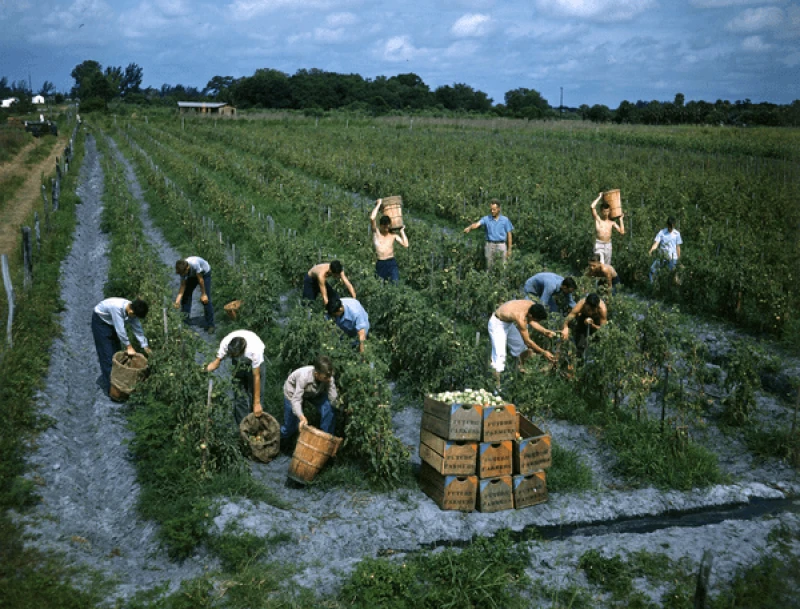‘Agriculture catches blame for climate change’: Here’s 3 ways innovation can transform farming challenges into solutions
‘Agriculture catches blame for climate change’: Here’s 3 ways innovation can transform farming challenges into solutions


Once viewed as problems, [the energy and transportation] industries are now being reframed as solutions. It’s time for us to take a similar approach to agriculture, a contributor to climate change that could potentially be one of our most powerful levers for reversing its course.
1. Boosting soil health
Over the past 40 years, erosion, pollution, and poor farming practices such as overgrazing and fertilizer misuse have stripped the earth of a third of its arable land… Studies have shown that regenerative agriculture practices such as no-till farming and the use of cover crops can meaningfully boost soil health by reducing erosion, improving water retention, and allowing bio-organisms to flourish.
…
2. Driving digital innovation
Across all industries, organizations are using data-driven insights to make smart, precise decisions based on real-time information. They’re implementing those decisions with user-friendly technologies that incorporate artificial intelligence, machine learning, edge computing, and robotics.
…
3. Supporting genome editing and biologicals
The European Parliament and the Council of the European Union are currently reviewing a proposal to reverse its ban on products developed using gene editing. Approval of this proposal, alongside measures to help consumers understand the distinction between GMOs and genome editing, will spur further innovation in this area.
Biologicals — agricultural technologies that harness nature to protect and improve the health of food crops — are another promising category.
This is an excerpt. Read the original post here

 | Videos | More... |

Video: Nuclear energy will destroy us? Global warming is an existential threat? Chemicals are massacring bees? Donate to the Green Industrial Complex!
 | Bees & Pollinators | More... |

GLP podcast: Science journalism is a mess. Here’s how to fix it

Mosquito massacre: Can we safely tackle malaria with a CRISPR gene drive?

Are we facing an ‘Insect Apocalypse’ caused by ‘intensive, industrial’ farming and agricultural chemicals? The media say yes; Science says ‘no’
 | Infographics | More... |

Infographic: Global regulatory and health research agencies on whether glyphosate causes cancer
 | GMO FAQs | More... |

Why is there controversy over GMO foods but not GMO drugs?

How are GMOs labeled around the world?

How does genetic engineering differ from conventional breeding?
 | GLP Profiles | More... |

Alex Jones: Right-wing conspiracy theorist stokes fear of GMOs, pesticides to sell ‘health supplements’




 Viewpoint — Fact checking MAHA mythmakers: How wellness influencers and RFK, Jr. undermine American science and health
Viewpoint — Fact checking MAHA mythmakers: How wellness influencers and RFK, Jr. undermine American science and health Viewpoint: Video — Big Solar is gobbling up productive agricultural land and hurting farmers yet providing little energy or sustainabilty gains
Viewpoint: Video — Big Solar is gobbling up productive agricultural land and hurting farmers yet providing little energy or sustainabilty gains Fighting deforestation with CO2: Biotechnology breakthrough creates sustainable palm oil alternative for cosmetics
Fighting deforestation with CO2: Biotechnology breakthrough creates sustainable palm oil alternative for cosmetics Trust issues: What happens when therapists use ChatGPT?
Trust issues: What happens when therapists use ChatGPT? 30-year-old tomato line shows genetic resistance to devastating virus
30-year-old tomato line shows genetic resistance to devastating virus California, Washington, Oregon forge immunization alliance to safeguard vaccine access against federal undermining
California, Washington, Oregon forge immunization alliance to safeguard vaccine access against federal undermining The free-range chicken dilemma: Better for birds, but with substantial costs
The free-range chicken dilemma: Better for birds, but with substantial costs ‘You have to treat the brain first’: Rethinking chronic pain with Sanjay Gupta
‘You have to treat the brain first’: Rethinking chronic pain with Sanjay Gupta
